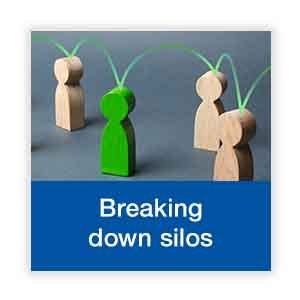
People with client-facing roles can often become focused on performing their job function and delivering on short-term targets when the organisation needs them to go further, add more value and act like a trusted adviser.
But how do you give people these consultative skills and a consultative mindset? You need to make people aware of when they are being transactional and provide them with the opportunities to learn and practice the confidence and behaviours to be transformational.
-
You have to encourage them to develop long-term partnership relationships with clients rather than focus on the functional in the present. Although it is more challenging, you want them to identify and talk to people on the client’s team who are senior enough to make decisions. You need them to explore, listen and understand the client’s business with the aim of becoming a trusted adviser.
1. Consultants
Typically, those in more technical consulting roles have a high IQ but lower EQ (emotional intelligence). They need to develop their people and social skills in order to have more engaging and productive conversations with clients.
-
Feedback
How to give feedback to clients, challenge them assertively, manage conflict and show resilience.
Scoping
How to understand requirements, get creative with options, show empathy and build the relationship.
Contracting
How to clarify expectations, develop a common understanding, and simplify/translate technical to business language.
Presenting
How to present ideas/recommendations, engage and inspire to follow or take action, make decisions and clear judgements.
-
Growing confidence and social skills for new consultants
One-day virtual and face-to-face simulators, for global consulting population. Each consists of four client meetings to practice, self-reflect, and get feedback from our expert actor-coaches. A professionally produced video series helps individuals embed their learning.
Client Simulator
2. Sales
Those in commercial roles - typically account managers or account directors - need to have ‘executive’ client conversations and develop more higher-value strategic relationships. They need to build their confidence and impact, enabling them to communicate effectively with C-suite level clients.
-
Builds trust
Is curious, builds deeper relationships, shows clarity of intention, is seen as a ‘trusted advisor’.
Exerts influence
Engages clients by adding value, gives advice, guides client through options.
Has presence
Shows strong and consistent personal brand, commands the stage and owns the space, inspires through story telling.
-
Developing higher value strategic relationships
A 6-week programme, integrated with work experience, for those in sales and consulting having more executive client conversations. A half-day ‘kick-off workshop’ (virtual) is followed by a full day of C-suite level client meetings (face-to-face) to practice and get feedback. A half-day group review session (virtual) helps to review learning and experiences.
3. Ambassadors
Those with roles promoting, profiling and building the brand and reputation of the organisation - typically those in marketing, PR roles and leadership roles - often struggle to convince prospective clients of the distinctive value of their organisation’s offer.
-
Confidence in how to prepare, present and land key messages
Understanding of how to bring messages to life with the art of storytelling
Effective presentation skills
Relaxed proficiency when being interviewed ‘on-camera’
Knowledge of how to build credibility and personal impact
-
Promoting the company’s reputation and brand
A 3-day interactive and immersive workshop (on storytelling, improvisation, presenting and on-camera skills) for brand ambassadors, SMEs and directors, to help them present confidently at EXPOs and trade events.
Presenting on-camera video content
One-day workshop for the learning and development team, to build their confidence and skills in presenting ‘on-camera’ for a series of scripted on-line training videos.













